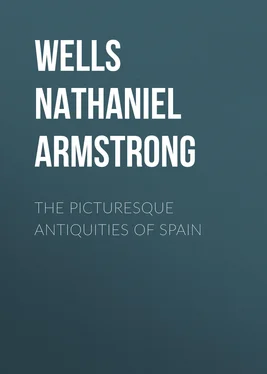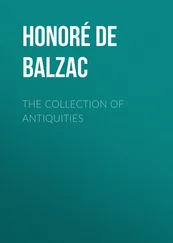Nathaniel Wells - The Picturesque Antiquities of Spain
Здесь есть возможность читать онлайн «Nathaniel Wells - The Picturesque Antiquities of Spain» — ознакомительный отрывок электронной книги совершенно бесплатно, а после прочтения отрывка купить полную версию. В некоторых случаях можно слушать аудио, скачать через торрент в формате fb2 и присутствует краткое содержание. Жанр: foreign_antique, foreign_home, visual_arts, на английском языке. Описание произведения, (предисловие) а так же отзывы посетителей доступны на портале библиотеки ЛибКат.
- Название:The Picturesque Antiquities of Spain
- Автор:
- Жанр:
- Год:неизвестен
- ISBN:нет данных
- Рейтинг книги:3 / 5. Голосов: 1
-
Избранное:Добавить в избранное
- Отзывы:
-
Ваша оценка:
- 60
- 1
- 2
- 3
- 4
- 5
The Picturesque Antiquities of Spain: краткое содержание, описание и аннотация
Предлагаем к чтению аннотацию, описание, краткое содержание или предисловие (зависит от того, что написал сам автор книги «The Picturesque Antiquities of Spain»). Если вы не нашли необходимую информацию о книге — напишите в комментариях, мы постараемся отыскать её.
The Picturesque Antiquities of Spain — читать онлайн ознакомительный отрывок
Ниже представлен текст книги, разбитый по страницам. Система сохранения места последней прочитанной страницы, позволяет с удобством читать онлайн бесплатно книгу «The Picturesque Antiquities of Spain», без необходимости каждый раз заново искать на чём Вы остановились. Поставьте закладку, и сможете в любой момент перейти на страницу, на которой закончили чтение.
Интервал:
Закладка:
Poitiers is a crazy old town, but contains one of the most admirable specimens of the architecture immediately preceding the pointed, or ogivale, and which the French savans call "the Romane." I allude to the church called "the Notre Dame de Poitiers." The west front is highly ornamented, and unites all the peculiar richness with the quaintness and simplicity of design which characterize that fine old style. I must not omit the forest of Chatellerault, passed through on leaving that town. It is famous as the scene of the picnic given to the ladies of the neighbouring city by the officers of a Polish regiment quartered there, immediately before the breaking out of the Peninsular war. It is related that Polish gallantry overstepped etiquette to such a degree,—and that by premeditation,—as to urge these cavaliers, by force of bayonet, and sentries, to separate all the husbands, and other male relatives, from the fairer portion of the guests. The consequences of such a termination of the festivities may easily be imagined; Bonaparte, a rigid judge with regard to all divorces except his own, on receiving the complaint of the insulted town, condemned the officers en masse to be decimated, and the survivors degraded from their rank. He relented, however, afterwards, on an understanding that they were to regain their sullied laurels in the Peninsula; where, in fact, in consequence of his orders, such opportunities were afforded them, that scarcely a man in the regiment survived the earliest campaigns.
The inhabitants of Chatellerault are said to take great offence on being asked their age, suspecting the inquirer of a malicious calculation.
The new quarter of Bordeaux is handsome, spacious, and airy. In the promenade called "La Quinconce," on the bank of the river, a large insulated edifice, the most monumental in view, is discovered by the inscription on its front to be an establishment for warm baths. At one extremity of the principal façade is seen, in sculptured letters, "Bains des dames;" at the other, "Bains des hommes." At this latter entrance a handsome staircase leads to the corridor of general communication, on the unsullied white wall of which the code of discipline of the establishment, traced in large sable characters, forces itself on the notice of the visitor. It consists of the following single and rather singular statute: "Il est expressement défendu aux garçons de permettre à deux hommes de se servir de la même baignoire." After some reflection I concluded it to be a measure of precaution with regard to cleanliness, carried, no doubt, to an extreme at Bordeaux. This town is well deserving of a few days' halt, should the traveller's object be amusement, or the pleasures of the table, for which it enjoys a well-merited reputation. It is a large and handsome city, the second in France in beauty, and vies with the capital in the elegance of its shops and principal streets. The theatre is, externally, the finest in France; and there is, besides the cathedral, and surpassing it in interest and antiquity, a remarkable Gothic church.
Of the sixty leagues which separate this town from Bayonne, forty afford the most perfect example of monotony. One sighs for the Steppes of Russia. These are the well-known Landes, consisting of uncultivated sands and morass; now covered league after league with the unvarying gloom of the pine and cork forests,—now dreary and bare,—but ever presenting to the wearied eye a wide interminable waste, replete with melancholy and desolation. It is true, that a day of pouring rain was not calculated to set off to advantage the qualities of such a region, and should in strict justice be admitted in evidence before passing condemnation on the Landes.
LETTER III.
THE BASQUE PROVINCES
It never causes me surprise when I see the efforts made by persons of limited means to obtain the situation of Consul in a continental town.
In spite of one's being, as it were, tied to one's residence,—and that not one's home,—there are advantages which counterbalance the evil. The place carries with it a certain degree of consequence. One feels oneself suddenly a man of influence, and a respectable public character. I have heard one, certainly far from being high on the list of these functionaries, termed by a humbler inhabitant of his "residence," the "Premier Consul."
The income, too, is, it is true, limited; but then one is usually in a cheap place. In fact, I always envied these favoured individuals. No calling, however, is without its déboires . It seems as if Providence had decreed that an income cannot be fairly, if agreeably, earned. Thus, the set-off against the bliss of the consul, is the necessity he is under of holding out his hand for his fee. I make these remarks, to introduce to your notice an ingenious method, put in practice—probably invented—by our consul at Bayonne, for getting over the irksomeness of this duty. I found him in his bureau , pen in hand, and a large sheet of official-shaped paper before him, half written over. On my passport being presented for his visa , his countenance assumed a painful expression, in which regret was blended with a sort of tendency to compassion, and which at first occasioned me a sensation of alarm, conjuring up in my imagination all the consequences of an irregular passport—tedious routes to be retraced, time lost, expense incurred, and suspicion, and even incarceration—infection—death!
Meanwhile he pointed to the letter he was writing, and, drawing forward with the other hand a chair, said that he was at that moment memorializing the Foreign Office on the subject of these visas; that his pain was extreme at seeing travellers compelled to send or come to his office, and to lose thus much valuable time; he was likewise concerned at their having to pay three francs each for so useless a ceremony as his visa; but he wished it to be remarked, that it was at present a ceremony quite indispensable; since, only four days back, a gentleman had been compelled to return from the Spanish frontier (a distance of seven leagues) in the middle of the night, in consequence of his having neglected this, as yet, necessary observance. 1 1 The very polite individual alluded to no longer fills the post of Consul at Bayonne.
Leaving Bayonne by Diligence, although still at some distance from the frontier, you are already in a Spanish vehicle. The only difference consists in its being drawn by horses as far as Irun, a few hundred yards in Spain, at which place they are replaced by a team of mules; but the mayoral is Spanish from the commencement, as also usually the greater number of the travellers. From the first view of Spanish ground, the monotony of the landscape ceases, and gives place to picturesque scenery. This effect is as sudden as if produced by the whistle of a scene-shifter. From the brow of a hill the valley of the Bidassoa opens on the view, the bay on the right, two or three towns in the centre, and beyond them, stretching to the left, the chain of the Pyrenees. This opening scene is very satisfactory to the newly arrived traveller, whose expectations have been rising towards fever-heat as he gradually neared the object of his dreams—the "renowned romantic land;" the more so, as he is well prepared, by the Landes of France, to enjoy to the utmost the variety of scene afforded by the two days of mountain and valley which separate the frontier from the town of Vitoria.
The Diligence comes to a halt every afternoon; the day's journey having commenced at three in the morning. There are three of these days between Bayonne and Burgos. At Tolosa and Vitoria—the intermediate places of rest—the system is as follows: Arriving at about four in the afternoon, an interval is allowed of about two hours, which in a long journey can always be profitably employed, until the meal, called supper. This is Homerically plentiful, and varied sufficiently to suit the tastes of all such as are accustomed to the vicissitudes of travelling. The repast over, all gradually retire to their sleeping apartments, where they are undisturbed until two o'clock in the morning.
Читать дальшеИнтервал:
Закладка:
Похожие книги на «The Picturesque Antiquities of Spain»
Представляем Вашему вниманию похожие книги на «The Picturesque Antiquities of Spain» списком для выбора. Мы отобрали схожую по названию и смыслу литературу в надежде предоставить читателям больше вариантов отыскать новые, интересные, ещё непрочитанные произведения.
Обсуждение, отзывы о книге «The Picturesque Antiquities of Spain» и просто собственные мнения читателей. Оставьте ваши комментарии, напишите, что Вы думаете о произведении, его смысле или главных героях. Укажите что конкретно понравилось, а что нет, и почему Вы так считаете.












